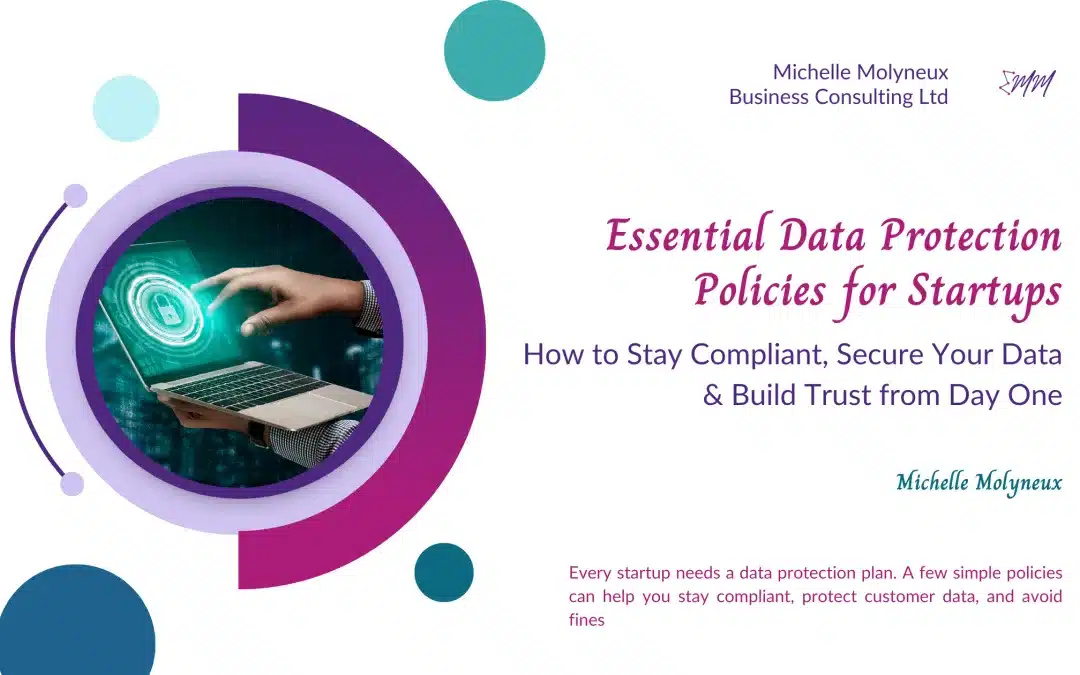How to Stay Compliant, Secure Your Data & Build Trust from Day One
Starting a business is exciting—you’re focused on growth, gaining customers, and making an impact. But have you considered how you’re protecting your customer and business data?
Many startups overlook data protection policies, assuming they’re only for larger companies. The reality? Every business that handles personal data must comply with GDPR and data privacy laws—no exceptions.
The good news? Setting up data protection policies isn’t as complicated as you might think. This guide will break it all down, covering:
✅ Why data protection policies matter for startups
✅ The essential policies you need from day one
✅ How to create them without legal jargon or stress
Let’s simplify data protection so you can focus on building your business confidently. 🚀
1. Why Startups Need Data Protection Policies (Even in the Early Stages!)
Think data protection is only for big businesses? Think again.
Collecting customer names, emails, payment details, or employee information legally requires you to protect that data. Without proper policies in place, you could face:
🔹 GDPR fines – The ICO (Information Commissioner’s Office) can fine businesses up to £17.5 million or 4% of their turnover for serious data breaches.
🔹 Reputation damage – If a data breach happens and customers lose trust in your business, it can derail your growth before scaling.
🔹 Operational chaos – Without clear policies, your team (even if it’s just you for now!) may not know how to handle data securely, what to do in a breach, or how long to keep customer records.
💡 Real-World Example: A UK-based startup was fined £60,000 for sending marketing emails without proper consent. The ICO ruled they didn’t have clear privacy policies in place. A simple data protection policy could have saved them!
2. The 5 Essential Data Protection Policies Every Startup Needs
To keep your business compliant and secure, here are the top 5 policies you need from the start:
📌 1. Privacy Policy (For internal and external individuals)
A Privacy Policy is legally required if you collect any personal data (even just an email for a newsletter!). It should include:
✅ What personal data do you collect (names, emails, payment info, etc.)
✅ Why you collect it (marketing, service delivery, customer accounts)
✅ How long do you keep it, and who do you share it with (third-party apps, payment providers)
✅ How users can access or delete their data (GDPR rights)
💡 Quick Fix: Add a clear Privacy Policy link for external individuals to your website’s footer.
📌 2. Data Retention & Deletion Policy
Startups often keep too much data for too long, which increases security risks. A Data Retention Policy sets clear rules on:
✅ How long do you keep customer and employee data
✅ When and how to delete old data securely
✅ The legal basis for storing information
💡 Best Practice: Set up automatic deletion schedules for old emails, customer records, and unused data to reduce risks.
📌 3. Data Incident Management Plan
No system is 100% secure—even startups need a plan for potential data breaches. Your response plan should cover:
✅ How to identify and contain a breach
✅ Who to notify (customers, ICO, affected parties)
✅ Steps to mitigate risks and prevent future incidents
💡 Pro Tip: If you suffer a data breach, you may need to report it to the ICO within 72 hours—having a transparent process in place ensures you act fast.
📌 4. Employee & Contractor Data Handling Policy
If you have a team or work with freelancers, they must understand how to securely handle personal data.
✅ Who has access to sensitive data?
✅ What security measures should be in place (passwords, MFA, encryption)?
✅ How should customer or employee data be shared (secure systems only!)?
💡 Startup Hack: Use restricted access settings on cloud storage and project management tools to limit exposure to only those who need it.
📌 5. IT Security & Acceptable Use Policy
With startups using a mix of cloud apps, AI tools, and third-party platforms, security risks can creep in unnoticed.
✅ Clear password policies (Use a password manager!)
✅ Device security (Personal vs. business devices)
✅ Rules for using AI tools and automation responsibly
💡 Pro Tip: Train your team (even if it’s just you and a VA) on phishing scams and online threats—these are some of the most significant startup cyber risks.
3. How to Set Up These Policies (Without the Overwhelm)
Not sure where to start? Follow these simple steps to create your policies:
Step 1: Map Out Your Data
🔹 What data do you collect?
🔹 Where is it stored (Google Drive, CRM, spreadsheets)?
🔹 Who has access to it?
Step 2: Use Templates & Expert Guidance
You don’t have to start from scratch—ICO provides free GDPR templates for privacy policies and data retention.
📌 ICO’s small business GDPR hub
Step 3: Communicate Your Policies
🔹 Publish your Privacy Policy on your website
🔹 Share your data policies with employees & contractors
🔹 Regularly review and update them as your startup grows
💡 Bonus Tip: As your business scales, a Data Protection Officer (DPO) or consultant can help you stay on top of compliance changes.
Final Thoughts: Protect Your Startup from the Start
Ignoring data protection won’t just cost you in fines—it could damage your startup’s reputation before you even get off the ground.
A few simple policies can help you stay compliant, build customer trust, and keep your data secure.
Do you need help setting up your startup’s data protection policies? We can help! We help startups navigate GDPR and data security without being overwhelmed.

